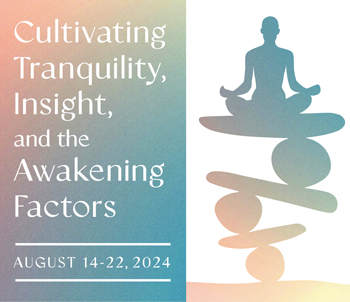Mid America Dharma News
Offering Insight Meditation to the Heartland | Fall 2024
Subscribe to our twice-annual newsletter and other announcements by entering your email address here:

Awakening Joy
Excerpt from an article for the Gay Buddhist Fellowship
by James Baraz
There are ten wholesome states that I say can really be cultivated easily. The first is the intention to be happy. Intending is the basis of all Karma as the Buddha said. Intending, I tell you, is Karma through body, speech and mind and it’s the second link in the eightfold path. Intention to be happy is one that doesn’t come quite as naturally to many people. We all want to be happy.

The Great Gift We Can Give To The World
by Annie Nugent
In these troubled times that we live in, we can find ourselves very unhappy with the way events are unfolding in the world and wanting them to be a different way than they are.
Not knowing how to make sense of it all, the question might arise: Is it possible to be truly happy amidst the challenges of this mystery that we call life?
It is often these unsatisfying or difficult times in life that bring us to the dharma in search of answers to this question.

Beyond Us and Them
by David Chernikoff
I’d like to share some reflections on an issue that’s been on my mind a lot lately. I’ve come to believe that one of the most useful yardsticks of spiritual maturity is our ability to embrace paradox and contradiction.
The longer we tread the spiritual path, the more likely we are to notice the presence of these koan-like aspects of our human experience. Examples that come to mind are being/doing, perfection/imperfection, light/darkness, and the one I’d like to explore in this article – us and them.

Seva aka Socially Engaged Buddhism
by Steve Eiffert
I began meditating many years ago my intention was to discover more of who I was. My focus was on myself. I did learn and continue to learn about myself as my experience and knowledge of the dharma deepens. At some point, I began to understand that the dharma was also teaching me how to interact with others more skillfully. I clearly saw how as my interactions with others improved, it positively impacted both my life and theirs.

Directly Experiencing Ourselves
by Daniel G. Weidner, MS, LMHP
“It is our fear at experiencing ourselves directly that causes suffering” Mark Epstein, M.D.
This quote is from Dr. Epstein’s book: Thoughts Without A Thinker: Psychotherapy from a Buddhist Perspective. This book is a lucid and fascinating examination of the complimentary relationship between Buddhist Psychology and modern Psychotherapy. T

Poems By Whitney Prince
Whitney Prince attended “Cultivating Tranquility, Insight and the Awakening Factors” retreat with Philip Jones held in August, 2024. These poems were inspired by his practice of the 16 steps of mindfulness of breathing found in the Ānāpānasati-sutta (MN 118).
Dana for Our Sangha
Mid America Dharma operates through the generosity of our volunteers and the financial gifts of our supporters, which help to cover our operating expenses, support our teachers and scholarship fund.
In the Pali language, generosity is called dana. Generosity is part of a 2600 year old tradition of supporting the Buddha’s teachings, Dharma teachers, and sangha through gifts. The practice of dana is more than just providing financial support. It allows each of us to explore the experiences of giving and receiving.
Mid America Dharma is very grateful for all the support we receive. If you are interested in giving dana to Mid America Dharma, you may donate online here or mail your gift by check to:
Mid America Dharma
c/o Carl Wingo
11900 N. Dripping Springs Rd.
Columbia, MO 65202
If you are donating by check, please designate in the memo line which of the following funds you would like your donation to support.
- MAD Operating Support
- MAD Scholarship Fund
- MAD Teachers
Retreat Basics: The Five Precepts
We ask everyone participating in our retreats to make a commitment to follow the Five Ethical Precepts, a foundation for our practice.
The precepts create the community of harmony and safety necessary for our work of turning inward. The self restraint we show by following the precepts is essential to settle the mind.
Through this we develop confidence in our work and ability to do the practice. Following the precepts bestows a sense of happiness with our own goodness.